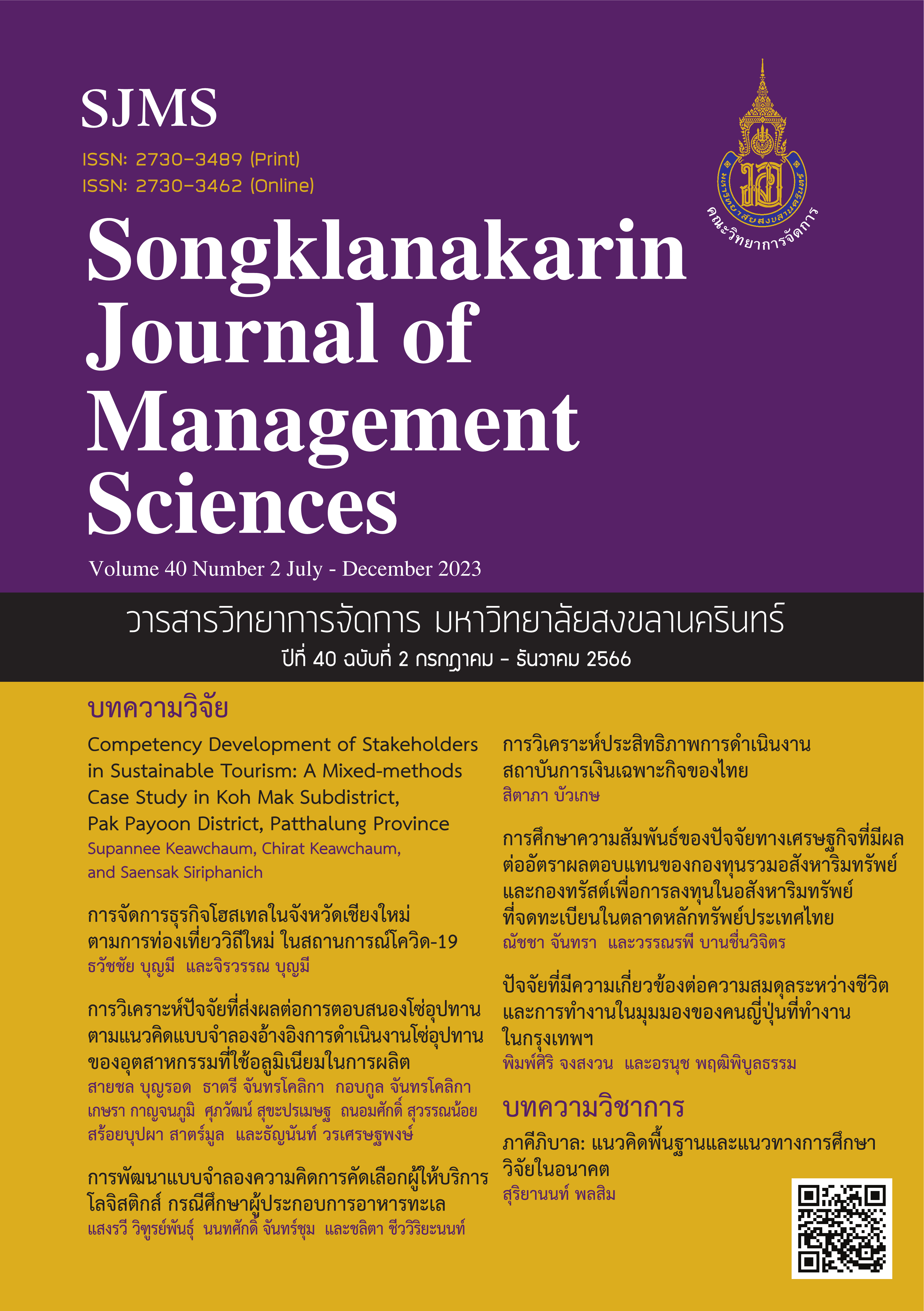Factors Related to Work Life Balance from Perspective of Japanese Expatriates in Bangkok
Main Article Content
Abstract
The objectives of the study are to examine the perspective on work-life balance of Japanese expatriates in Bangkok as well as the differences in work culture and factors that relate to the work life balance for Japanese expatriates in Bangkok. The samples were selected by convenience sampling and snowball sampling method which represented 15 Japanese expatriates. This study used semi-structure interviews for data collection and employed content analysis thereafter. The result of the study shows that the perspective on work-life balance of Japanese expatriates in Bangkok is relevant to both work life and personal life which go along together. The factors that relate to their work-life balance comprised 3 levels: individual factor, organizational factor, and social factor. Work and family values appear to be significant regarding the differences in work culture between Thai and Japanese people from the Japanese expatriates’ perspectives.
Organizational practices are recommended for enhancing relationship between Thai and Japanese in workplace and designing work life balance policies. Recommendations for Japanese who work or live in Thailand to improve work life balance are mainly openness for learning Thai culture, self-priority in work life balance and adaptation about perspectives to align with Thai people working style.
Article Details

This work is licensed under a Creative Commons Attribution-NonCommercial-NoDerivatives 4.0 International License.
All published articles are SJMS’s copyright. The editorial board allows all published articles to be copied, excerpted, or disseminated with academic citation.
References
Akakulanan, S. (2011). The Causal Relationship Model of Work-Life Balance Affecting The Employees’ Effective Work Behavior of the Automotive Part Manufacturers, The Eastern Thailand. Journal of Behavioral Science, 17(2), 85-102.
Clark, S. C. (2000). Work/family border theory: A new theory of work/family balance. Human relations, 53(6), 747-770.
Creswell, J. W., & Clark, V. L. P. (2017). Designing and Conducting Mixed Methods Research. Thounsand Oaks, CA: SAGE Publications.
Delecta, P. (2011). Review article work life balance. International Journal of Current Research, 3(4), 186-189.
Fapohunda, T. (2014). An exploration of the effects of work life balance on productivity. Journal of Human Resources Management and Labor Studies, 2(2), 71-89.
Gartner. (2020). Gartner HR Survey Reveals 88% of Organizations Have Encouraged or Required Employees to Work From Home Due to Coronavirus. Retrieved July 10, 2022, from https://www.gartner.com/en/newsroom/press-releases/
Gautam, I., & Jain, S. (2018). A study of work-life balance: Challenges and solutions. International Journal of Research in Engineering, IT and Social Sciences, 12(8), 198-217.
Greenhaus, J. H., Collins, K. M., & Shaw, J. D. (2003). The relation between work–family balance and quality of life. Journal of Vocational Behavior, 63(3), 510-531.
Hofstede Insights. (2010). Country comparison. Retrieved August 25, 2021, from https://www.hofstede-insights.com/country-comparison/japan,thailand/
Holumyong, C., Kittisuksathit, S., & Kanlek, M. (2017). Work, family and society: A work-life balance that involves more than just time management of Expatriates in the industrial production. Kasetsart Engineering Journal, 19(2), 88-102.
Jindarak, P., & Kasem, S. (2019). Work-Life Balance and Generations Diversity. Executive Journal, 39(1), 3-11.
Madhusudhan, V. G., & Nagaraju, K. (2013). Work life balance of teaching faculty with reference to Andhra Pradesh engineering colleges. Global Journal of Management and Business Studies, 3(8), 891-896.
Mello, S. F., & Tomei, P. A. (2021). The impact of the COVID-19 pandemic on expatriates: A pathway to work-life harmony?. Global Business and Organizational Excellence, 40(5), 6-22.
OECD Better Life Index. (2020). Japan How’s Life?. Retrieved June 14, 2021 from https://www.oecdbetterlifeindex.org
Ono, H. (2018). Why Do the Japanese Work Long Hours? Sociological Perspectives on Long Working Hours in Japan. Japan Labor Issues, 2(5), 35-49.
Saengrotkittikhun, W., & Choochom, O. (2021). Personal and Social Environmental Factors Related to School Work-Life Balance of Graduate Students in Bangkok. Warasan Phuettikammasat, 27(2), 63-77.
Sattavorn, S. (2019). Leadership and Work Values in Thai and Japanese Organizations. Japanese Studies Journal, 37(1), 18-19.
Swierczek, F. W., & Onishi, J. (2003). Culture and conflict: Japanese managers and Thai subordinates. Personnel Review, 32(2), 187-210.
Takagi, K., & Tagami, T. (2019). Work-style reform of emergency physicians: the Japanese experience. European Journal of Emergency Medicine, 26(6), 398-399.
Thailand Board of Investment. (2021). Foreign investment reports and statistics. Retrieved July 20, 2021, from https://www.boi.go.th/index.php?page=statistics_oversea
Thailand Development Research Institute. (2020). The impact of working from home during COVID-19: a case study of TDRI. Retrieved June 25, 2021, from https://tdri.or.th/2202/05
Timinsky, S. J. (2019). The nation that never rests: Japan’s debate over work-life balance and work that kills. The Asia-Pacific Journal, 17(10), 1-9.
Utsahajit, W. (2014). A perfect day of work. Human Resources and Organization Development Journal, 6(1), 37-38.
Vyas, A. & Shrivastava, D. (2017). Factors affecting work life balance - A review. Pacific Business Review International, 9(7), 194-200.
Walton, E. (1975). Criteria for Quality of Working Life. The Quality of working Life: Problems, Prospects and the state of the Art. (1). Louis, E., Cherns, B., & Associates. New York: A Division of Macmillan. Pp. 91-104.
World Health Organization. (2021). Long working hours increasing deaths from heart disease and stroke: WHO, ILO. Retrieved May 30, 2021, from https://www.who.int/news/item

